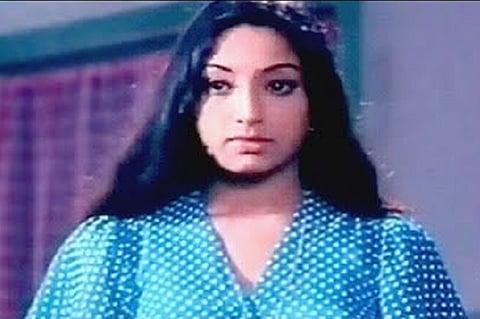

As with Hindi cinema, where Anglo-Indians had certain token roles (vamp, villain’s henchmen, beer-guzzlers, landlords), Malayalam cinema too has spared no expenses to constantly typecast the community since time immemorial.
Their women have been labelled promiscuous, men lazy, inept and heavy drinkers and the language a blend of heavily accented English and Malayalam. They were also stuck with the same names—Peter, Tony or called Saiyippu to underline their English roots. The women were called Madhama.
One of the most popular instances of stereotyping was in the 1975 film Chattakkari directed by KS Sethumadhavan which had the heroine Julie (played by Lakshmi) fall in love with a Hindu man and end up an unwed mother. The entire family was an exercise in typecasting—the alcoholic subservient father, the dominating mother, guitar sessions and a home that has seen better days. Short frocks, tight tops and pants for the ladies and dungarees for the men. Clothes designed to draw attention to the contours of their body, thereby hinting at their promiscuity. Premarital sex was somehow always associated with this community.
An Anglo-Indian character in Malayalam cinema is always in a financial crunch. They would also play roles of fussy and comical landlords (Kunchan in various films), who rent their rundown bungalows. They always talked about an identity crisis and spoke about migrating to England. Very few films have tried to grasp the lives of Anglo-Indians with authenticity.
Ee Thanutha Veluppan Kalathu had Suresh Gopi playing one of the prime suspects as an Anglo-Indian chap called Christy.
Sukumari has successfully been typecast as an Anglo-Indian in various films. The quirky Dickammayi in Boeing Boeing, Maggie Aunty in Vandanam and the Mumbai widow who would regale everyone with tales of her deceased husband in Shubhayathra
In Orkkapurathu, Mohanlal played Freddy and Nedumudi Venu, was his jovial, pipe-smoking dad, who agrees to a kidnapping to earn money. But they are not nuanced Anglo-Indian characters.
Shyama Prasad is one director who is forever fascinated with Anglo-Indians, as most of them are either inspired from classic English literature or films. Akale, his adaptation of Tennyson’s Glass Menagerie had quintessential Anglo-Indian characters headlining the narrative. However, it did look like they were part of a stage play than a film.
In Big B, based entirely in Fort Kochi (another regular milieu) the antagonist, Sayippu Tony is said to born to a local call girl who used to solicit English sailors.
The best depiction of Anglo-Indian must be Siddique in the recent Hey Jude. As Jude’s quirky dad, Dominique Rodriguez, he strays away from all existing stereotypes associated with the portrayal of Anglo-Indian dads. He neither spoke broken/accented Malayalam, nor was he a loser - on the contrary he was a canny businessman.
This article was originally published on Fullpicture.in. The News Minute has syndicated the content. You can read the original article here.